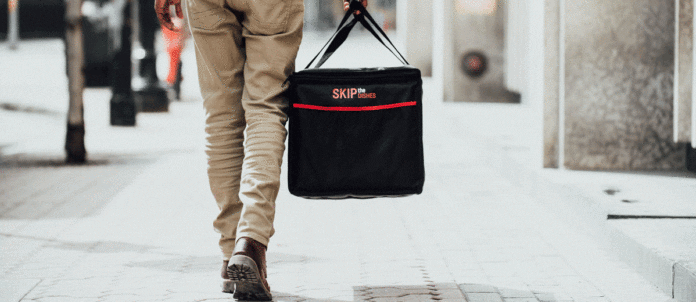It’s widely agreed, COVID-19 has essentially put a halt to normal restaurant operations. Despite restaurants in some regions having the option to offer dine-in service, many pre-emptively closed their dining rooms and health concerns undoubtedly steered customers away from dining in.
As restaurants were forced to rely more heavily — then almost completely — on delivery in order to stay in operation as the COVID-19 crisis evolved, third-party-delivery platforms became essential to success. In fact, many operators are thankful to have them available during this economic crisis. However, while many platforms — such as Uber Eats, DoorDash and SkipTheDishes — have implemented measures to help support Canadian restaurants, some restaurateurs feel high commission fees are hurting them further during this crisis.
Nick Di Donato, president & CEO of Toronto-based Liberty Entertainment Group, notes the commissions charged by Uber Eats in particular — which has the highest fees — are unsustainable for his business.
“The Uber Eats model is one that’s not sustainable and makes it very difficult for any operator to make any money,” he says. “When we’re open regularly, Uber Eats was always incremental revenue, so many of the costs — for example, your chefs in the kitchen, your managers, people who take an order online — are [already there] so there’s minimal incremental costs of labour associated with an Uber Eats order. Today, all I have is Uber Eats and they’re charging me 30 per cent. Typically, our food costs are between 30 and 35 per cent…packaging is another five per cent, so when you add on the Uber Eats charge, the operator makes zero.”
As part of Uber Eats’ support package, the aggregator included waiving delivery fees on all its orders from independent restaurants and dedicated in-app and email-marketing campaigns to promote delivery from local restaurants, especially those new to the app. The platform also introduced an option for restaurants to receive daily payouts rather than the standard weekly payout.
According to an Uber Eats spokesperson, “We support efforts to help the hospitality industry, which is why we’ve focused the majority of our efforts on driving demand to independent local restaurants, which we know is a key concern of our partners during these unprecedented times.
“But providing our platform and services to restaurants costs money — changing commission rates would force us to alter the way we do business, potentially hurting those we’re trying to help the most: customers, small businesses and delivery people.”
But Di Donato and other independent operators like him, feel the restaurants would have been better served if, rather than driving volume by offering free delivery to consumers, savings would have been passed along to restaurant operators instead.
“Consumers want to help the restaurants and the situation we’re in,” he explains, adding that many would be willing to pay delivery fees to do so. “They’re probably ordering from Uber Eats, to some degree, to support the restaurant industry, but really aren’t aware that we’re just covering our costs.”
According to Tony Elenis, president & CEO of the Ontario Restaurant Hotel and Motel Association, “In these challenging times, all services who are working with hospitality operations should be accommodating in reducing their prices. Delivery providers whose total success rests on the existence of restaurants must reduce their high commissions as the industry is hurting. When this crisis is over, the industry will remember those who were flexible and compassionate.”
Some aggregators, such as DoorDash, have implemented various changes. For example, from March 17 through the end of April, it allowed independent restaurants in Canada to join the platform for free and pay zero commissions for 30 days. And then, in April, the company announced a 50-per-cent reduction in commission fees for local restaurant partners. In March, it had eliminated commission fees on pickup orders for existing DoorDash partners and added “more than 100,000 independent restaurant partners” across its network to its $0-delivery subscription program DashPass. These programs are currently set to continue through the end of May.
DoorDash also launched a ‘Local-Restaurant-Saturdays’ promotion, which offers no delivery fee on orders over $15 from local restaurants. Additionally, the company committed up to $20 million in merchant-marketing programs. This included the #OpenForDelivery multi-platform campaign that launched in the U.S. and Canada to let consumers know restaurants are open, delivery is safe and restaurants need patronage to weather COVID-19. The campaign also included the launch of the openfordelivery.com website.
SkipTheDishes launched a 30-day support package (on March 19) that includes an automatic 15-per-cent rebate on commissions for all orders through the platform. It also introduced an option for customers to leave a tip for restaurants through their menus, with 100-per-cent of the tip going directly to the restaurant. SkipTheDishes has indicated it continues to work on immediate and long-term initiatives as COVID-19 evolves.
For its part, foodora has not introduced sweeping measures to aid the restaurant industry. However, in a newsletter announcing an exclusive free-delivery deal with the platform, Toronto-based restaurant Salad King stated: “We will continue to work exclusively with [foodora] for delivery because we believe good businesses should support other good businesses. Unfortunately, they don’t have the deep pockets of the other companies and can’t offer free delivery for all, and we’re grateful that foodora is able to work with us to present this offer to our customers. Please continue to support your favourite restaurants and foodora — and not just the ones who can afford free delivery.”
While it hasn’t announced broad free-delivery offerings, foodora already had a program in place where it partners with a selection of top restaurants in the cities it operates in — on a rotating, month-long basis — to offer free delivery. This program is still in place.
foodora’s parent company, Berlin-based Delivery Hero, has stated it’s “implementing measures according to local need, including more frequent payment. For new restaurants joining our platform, we aim to onboard as fast as possible in order to support them in maintaining order levels as well as provide more choice for our customers.” But there is no indication of how or if this will impact foodora Canada.
A report from Toronto-based business-law firm, Osler, recommends franchisors/operators “research which services offer the best value and consider negotiating a commission waiver if none is being offered.”


















